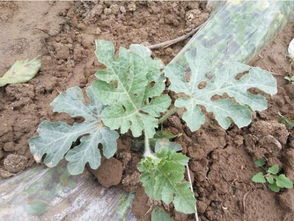西瓜的英文单词是什么?
Watermelon, a refreshing and delightful fruit, holds a special place in the hearts of many due to its juicy, sweet flesh and hydrating properties. The word "watermelon" itself evokes images of sunny days, outdoor picnics, and the satisfying crunch of every bite. But have you ever stopped to think about how this fruit got its name, or what other English words are associated with watermelons? In this article, we'll delve into the lexicon of watermelon, exploring a variety of terms, phrases, and expressions that relate to this beloved summer fruit.

To start, let's break down the word "watermelon." In English, it's a compound word formed by combining "water" and "melon." The name is quite literal, as watermelons are known for their high water content, often exceeding 90% of their total weight. This makes them an excellent source of hydration, especially during hot weather. The term "melon," on the other hand, is a broader classification that includes various types of sweet, fleshy fruits with hard rinds and edible seeds or seedless varieties. Other melons in this family include cantaloupe, honeydew, and crenshaw.

Moving beyond the basic term, let's consider some synonyms for watermelon. While "watermelon" is the most commonly used word, you might encounter alternatives like "water-melon," "water gourd," or even "citrullus lanatus" (its botanical name). However, these synonyms aren't widely used in everyday conversation. "Water-melon" with a hyphen is redundant and not preferred, while "water gourd" is more of a generic term that can refer to several types of water-storing gourds. "Citrullus lanatus" is useful for scientific or botanical contexts but less so for casual discussion.
Now, let's explore some idiomatic expressions and slang terms related to watermelon. One popular saying is "as cool as a cucumber—or a watermelon on a hot day," which means someone or something is very calm and composed, especially in stressful situations. Watermelons are also featured in the phrase "going to seed," which, when used metaphorically, means to deteriorate or lose effectiveness over time, just as a watermelon left too long on the vine will begin to produce hard, unpalatable seeds.
In terms of slang, watermelons aren't as prominently featured as some other fruits, but there are a few playful expressions. For instance, someone might be called a "watermelon head" affectionately, usually in jest, to emphasize their round or large head shape. While this term isn't offensive, it's important to note cultural context and sensitivity when using such nicknames.
Watermelons have a rich history and cultural significance around the world. In many regions, they are symbols of abundance, fertility, and refreshment. In China, for example, watermelons are associated with summer solstice and are often eaten during the Dragon Boat Festival to ward off heat and bring good luck. In the southern United States, watermelon picking and eating contests are popular at county fairs and festivals, celebrating the fruit's role in local agriculture and tradition.
Cultural expressions extend to literature and folklore as well. In various African American folktales, watermelons serve as symbols of resilience and community. These stories often highlight the ingenuity of African American slaves who found ways to cultivate and enjoy watermelons despite their harsh living conditions. In more contemporary literature, watermelons can serve as metaphors for something large, round, or juicy—perhaps hinting at a juicy gossip or a significant revelation.
Watermelon's nutritional benefits are also noteworthy. Beyond their hydrating qualities, watermelons are rich in vitamins A and C, antioxidants, and amino acids. They contain lycopene, a compound known for its cancer-fighting properties, and have been shown to support heart health and improve skin elasticity. The high potassium content helps regulate blood pressure, while the fiber aids in digestion.
Because of these health benefits, watermelons have become popular ingredients in various diets and wellness trends. Smoothies, juices, salads, and even watermelon kefir are just a few examples of how this versatile fruit can be incorporated into healthy eating plans. Watermelon seeds, often discarded, are also edible and packed with nutrients like magnesium, zinc, and protein, making them a nutritious snack option when roasted or sprouted.
In culinary terms, watermelons are versatile and can be enjoyed in numerous ways beyond slicing and eating them raw. Grilled watermelon steaks, pickled watermelon rind, and watermelon gazpacho are just a few creative dishes that showcase the fruit's adaptability in the kitchen. Their sweetness pairs well with salty, savory, and tangy flavors, making them an excellent canvas for experimentation.
- 上一篇: 《四大神兽之首是谁》
- 下一篇: 申通快递投诉电话及投诉方法是什么?
新锐游戏抢先玩
游戏攻略帮助你
更多+-
02/07
-
02/07
-
02/07
-
02/07
-
02/07









